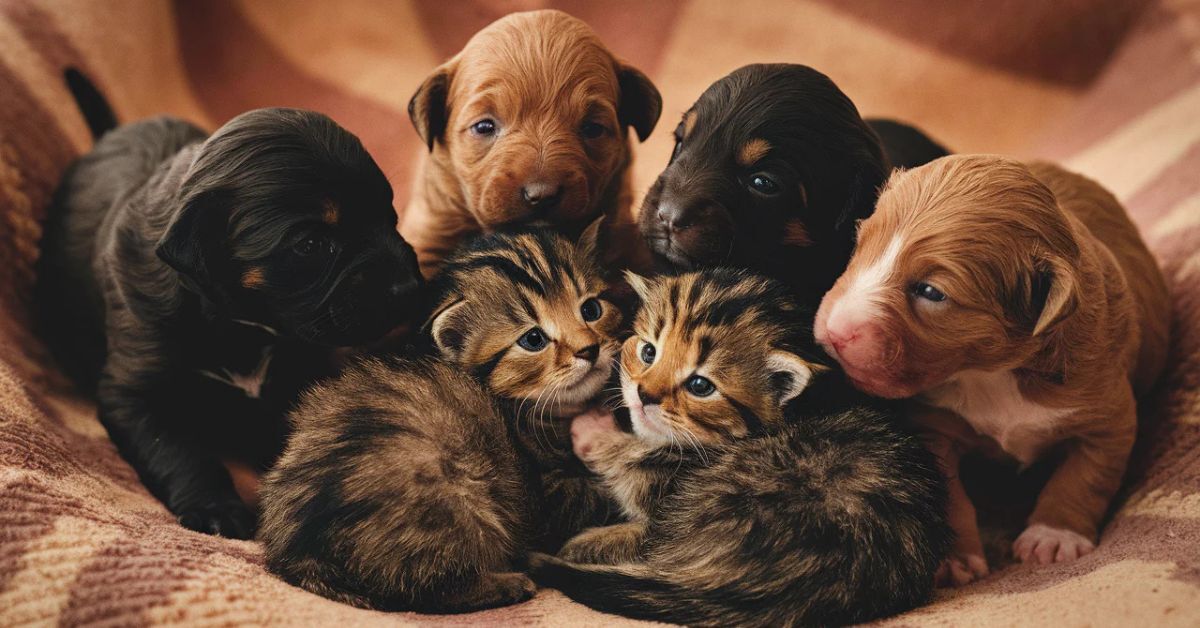When it comes to adorable, tiny creatures, few things tug at our hearts more than newborn kittens and puppies. Both are undeniably cute, but there are notable differences between these two types of baby animals. In this article, we will delve into the world of newborn kittens vs newborn puppies, comparing their behavior, development, care needs, and more. Whether you’re a new pet owner or simply curious about the early stages of life for these lovable creatures, this comparison will offer you valuable insights.
Table of Contents
- Introduction to Newborn Kittens and Puppies
- Physical Development: Kittens vs Puppies
- Behavior and Socialization
- Feeding and Nutrition
- Health Considerations
- Caring for Newborn Kittens vs Newborn Puppies
- Comparison Chart: Newborn Kittens vs Newborn Puppies
- Conclusion
1. Introduction to Newborn Kittens and Puppies
During the first few weeks of their lives, newborn kittens and puppies are extremely vulnerable and reliant on their moms. Their early experiences influence how their social and physical abilities grow as well as how they behave as adults. Nevertheless, despite their commonalities, kittens and puppies differ greatly from the time of birth.
Although some may have as few as one or as many as 10 siblings, newborn kittens are usually born in litters of three to five. They are totally reliant on their mother for care, warmth, and nourishment; they are also blind and deaf. In contrast, puppies are born into litters of four to twelve. They are born blind and deaf, much like kittens, but their growth and socialization requirements are a little different.
2. Physical Development: Kittens vs Puppies
Despite their early helplessness, Newborn Kittens vs Newborn Puppies mature at varied rates. A closer look of their physical development is provided below:
Newborn kittens:
Weight: A kitten weighs between 85 and 115 grams (3 and 4 ounces) at birth. In the first week, their weight may double.
Dimensions: Kittens are little and delicate. They are mostly covered in silky, fine fur and measure roughly 3 to 4 inches in length.
Motor Skills: Kittens’ motor skills are immature at birth. They use their front paws to crawl and nuzzle their mother throughout the first few days.
Newborn Puppies:
Weight: Depending on their breed, puppies typically weigh between 200 and 500 grams (7 and 17 ounces), making them larger than kittens at birth.
Size: Compared to kittens, puppies have a more robust physical structure and are typically 6 to 8 inches long.
Motor Skills: Although they are still very unsteady, puppies start to walk two to three weeks after birth, which is earlier than kittens.
Puppies typically mature physically more quickly than kittens since they are larger at birth. During the first few months, both species will continue to grow quickly, but puppies often attain physical maturity earlier than kittens.
3. Behavior and Socialization
As they start interacting with their surroundings, the behavioral distinctions between Newborn Kittens vs Newborn Puppies become increasingly apparent. Their species and early socialization experiences influence their learning and instinctive behaviors.
Newborn kittens:
Socialization: In their early years, kittens are less dependent on social interaction and more reclusive. They naturally look to their mother for warmth and sustenance, but until they are a few weeks old, they are less likely to engage in social activities like play.
Temperature: Compared to puppies, most kittens are more self-reliant. Though not as obviously cuddly as puppies, they are inherently curious.
Learning: By the time they are three weeks old, kittens are able to groom themselves and investigate their environment. As they mature, they will begin to hone their predatory tendencies by practicing stalking and pouncing.
Newborn Puppies:
Socialization: Due to their high level of socialization, puppies are more likely to interact with humans and their littermates from an early age. Soon after birth, they start playing with their mother and each other.
Temperature: Puppies are more likely to be devoted to their owners and reliant on them. Compared to kittens, they actively seek for warmth, comfort, and company.
Learning: Puppies pick things up quickly and react to their surroundings. They start displaying early social behaviors, like wagging their tails and reacting to acoustic cues, by the time they are two or three weeks old.
Puppies usually display more noticeable social tendencies earlier than kittens, but both are gorgeous at this stage. In general, this makes puppies more gregarious during the first few weeks of life.
4. Feeding and Nutrition
Both Newborn Kittens vs Newborn Puppies rely heavily on their mothers’ milk for nourishment in the first few weeks. However, the way they feed and their nutritional needs are slightly different.
Newborn Kittens:
Milk: Kittens rely on their mother’s milk, which provides all the nutrients they need for the first few weeks of life. A kitten’s digestive system is extremely sensitive, and it requires the rich, fatty milk produced by the mother.
Weaning: Kittens typically begin the weaning process between 3 to 4 weeks of age. Initially, their mother will begin to introduce solid food, but kittens will still rely on milk during this transition period.
Newborn Puppies:
Milk: Similar to kittens, puppies rely on their mother’s milk during the first few weeks of life. Puppy milk is slightly higher in protein and fat compared to kitten milk, supporting their faster growth rate.
Weaning: Puppies begin weaning between 3 to 4 weeks old as well. Their mother will start to introduce them to solid food, although like kittens, they still need a high level of nutrients from milk.
Both species require significant care and attention during the weaning process to ensure that they receive the proper nutrients. Puppy formula and kitten milk replacement formulas are available if the mother cannot nurse them.
5. Health Considerations
Newborn Kittens vs Newborn Puppies are vulnerable to a number of health issues, especially during their first few weeks. While both species are at risk for similar conditions, there are differences in how they develop immunities and their susceptibility to certain diseases.
Newborn Kittens:
Common Issues: Kittens are more likely to suffer from respiratory infections, particularly if they are born in less-than-ideal conditions. They are also at risk of dehydration and hypothermia, as they cannot regulate their body temperature well in the first days of life.
Vaccinations: Kittens typically receive their first vaccinations around 8 weeks of age. Until then, their immunity is provided by their mother’s colostrum (the first milk).
Newborn Puppies:
Common Issues: Like kittens, puppies are at risk for infections, but they are particularly vulnerable to parasites, such as worms, which can affect their health in the early days.
Vaccinations: Puppies begin their vaccinations at around 6-8 weeks of age. As with kittens, their immunity is derived from their mother during the first few days of life.
Both Newborn Kittens vs Newborn Puppies require regular veterinary care, especially during their early weeks. Dehydration, malnutrition, and infection are the most significant risks in their first few weeks, so monitoring their health closely is essential.
6. Caring for Newborn Kittens vs Puppies
Caring for newborn kittens and puppies involves similar routines, but some key differences should be kept in mind:
Newborn Kittens:
Temperature: Kittens are especially sensitive to cold temperatures. A heating pad or warm towels may be necessary to help them regulate body heat.
Feeding: If the mother is unavailable, kittens will require kitten milk replacement formula. It’s crucial not to feed them cow’s milk, as it can cause digestive issues.
Socialization: While kittens tend to be more independent, early socialization with humans and other animals is still important. Handling them gently will help them grow accustomed to human interaction.
Newborn Puppies:
Temperature: Puppies are also susceptible to the cold, but they are generally a bit more resilient than kittens. Like kittens, they will need a warm environment for the first few weeks.
Feeding: If the mother is not available, puppy formula should be used. As with kittens, it’s crucial to avoid cow’s milk.
Socialization: Early socialization is key for puppies, as they are very responsive to human interaction. Gentle handling and early experiences with other pets can help them develop into well-adjusted adults.
Both kittens and puppies require a safe, warm, and nurturing environment during their first few weeks of life. Their mother’s presence is critical, but when that’s not possible, human intervention is necessary.
7. Comparison Chart: Newborn Kittens vs Newborn Puppies
| Feature | Newborn Kittens | Newborn Puppies |
| Birth Weight | 85-115 grams (3-4 oz) | 200-500 grams (7-17 oz) |
| Size | 3-4 inches | 6-8 inches |
| Development Speed | Slower motor skills development | Faster motor skills development |
| Feeding Needs | Mother’s milk (high in fat) | Mother’s milk (higher in protein) |
| Weaning Time | 3-4 weeks | 3-4 weeks |
| Social Behavior | More independent | Highly social and interactive |
| Health Risks | Respiratory infections, dehydration | Parasites, infections |
| First Vaccinations | 8 weeks | 6-8 weeks |
Conclusion
The comparison between newborn kittens and newborn puppies highlights both similarities and differences in their early lives. Both are incredibly vulnerable at birth, relying on their mothers for warmth, nourishment, and care. However, newborn puppies tend to develop faster physically and socially than kittens, who are more independent. Understanding these differences can help pet owners provide the best care for these young animals, ensuring they grow into healthy, happy pets.
Whether you’re preparing for the arrival of newborn kittens or puppies, this comparison offers valuable insights into their care requirements, growth stages, and the challenges that come with raising them during their first weeks of life.







